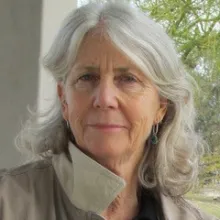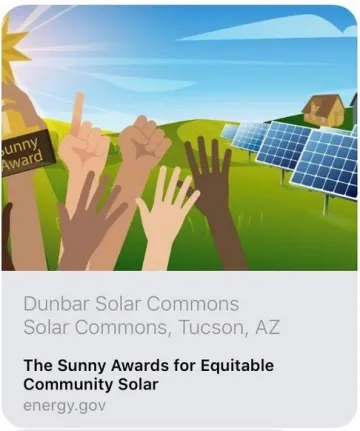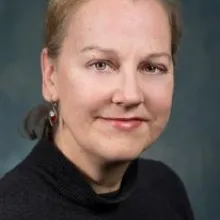Topic: Introducing the Solar Commons Research Project: How arts partnerships help drive equity, community participation, and adoption of shared renewable energy
When
This presentation was recorded on Friday, October 6, 2023 at 12:00 PM in ENR2 room S215.
If you would like to view this seminar, you may find the recording on our YouTube Channel, direct link to the presentation is HERE.

Ellen McMahon
Associate Dean for Research, College of Fine Arts
Professor, School of Fine Art
University of Arizona

The Tucson Solar Commons Project was the recipient of a US DoE Sunny Award for Equitable Community Solar in 2022.
https://www.energy.gov/communitysolar/sunny-awards-equitable-community-…

Kathryn Milun
Associate Professor of Anthropology
Founder & Director of The Solar Commons Project
University of Minnesota, Duluth
"Introducing the Solar Commons Research Project: How arts partnerships help drive equity, community participation, and adoption of shared renewable energy"
With the passage of historic clean energy legislation, the US transition to renewable energy has been tied to federal directives adopting an energy democracy framework. Nowhere is this more visible than in distributed solar energy generation, an approach that places solar panels near where power is needed, such as on rooftops, in parks, schoolyards, and other spaces near homes, businesses, and industrial users. What’s more, policy shifts and funding requirements, such as community benefit plans, now tie rebates and credits for solar owners and funding for solar technology research to more equitable social outcomes From the new “Environmental Justice Tax Credit” to the cross-government “Justice 40 Initiative,” federal dollars invested in renewable energy infrastructure are set to flow to underserved communities. Solar engineers now need “Community Benefit Plans” that prove their EPA and DoE grant dollars are meaningfully shared with historically underserved communities. To realize these aspirations, solar energy experts can collaborate with community-engaged social scientists, activists and public artists. The Solar Commons Research Project demonstrates how such collaborations can expand community participation and transform community perception of the value of solar energy. Solar Commons are a new, shared-equity ownership model for community solar. Instead of delivering solar savings as benefits to individual households, Solar Commons disburses those savings as funds for community wealth-building projects in local neighborhoods. This talk describes work that the Solar Commons Research Project undertook with the University of Arizona School of Art. In two projects, one interconnected Solar Commons project serving Tucson’s Garden District and the other a DoE-sponsored district solar design competition for undergraduate students, arts collaboration created a new public face for community-owned solar. It reframed highly complex legal and technical aspects of community solar in beautiful, place-based ways that communicated local values and shared belonging. Offering images of the public mural and neighborhood art activities, as well as reflections from our published research on the collaboration, we discuss how solar misperceptions were transformed and solar economic value was shared thanks to an art-based approach to community solar.
